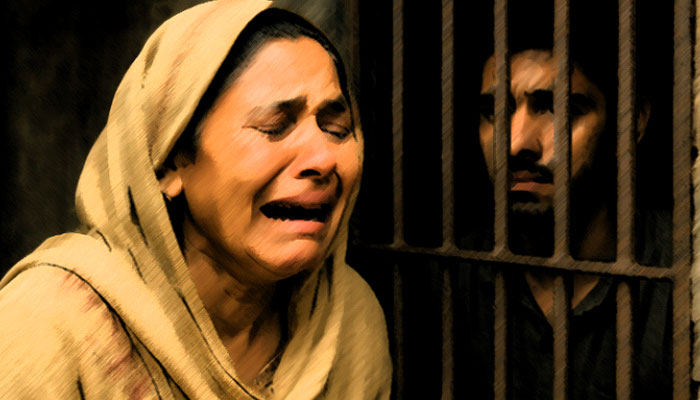The saga of Kashmir’s imprisoned—both within the barbed boundaries of the Valley and scattered across India’s penal landscape—is not confined to iron bars or crumbling prison walls. It bleeds through the blistering plains of India, where sons of the mountains are buried alive in alien cells. This is not mere incarceration; it is exile layered upon exile. Torn from their homeland, separated from their language, faith, families, and skies, these prisoners are condemned to vanish in silence—out of sight, out of reach, and out of memory. This systematic dispersal of Kashmiri political prisoners—from Delhi’s Tihar Jail to the scorched barracks of Gujarat, Uttar Pradesh, Madhya Pradesh, Rajasthan, and even Tamil Nadu—is not a matter of state convenience. It is a matter of state vengeance. Every mile between the prisoner and his mother is an act of calculated cruelty. Every courtroom delay, every denied visit, every unacknowledged plea is a deliberate act of erasure. In the cruel architecture of Indian occupation, perhaps the most insidious pillar is the policy of transferring Kashmiri political prisoners to the farthest corners of the Indian mainland—a cruel exile within exile. From the snow-laced valleys of Kashmir to the heat-struck barracks of Vellore, Bhopal, or Jaipur, thousands of Kashmiris are torn from their emotional, cultural, and spiritual lifelines. It is not just a physical displacement—it is a psychological decapitation. Imagine a mother in Sopore whose son is locked away in Varanasi—1,800 kilometers from her doorstep. Her eyes grow old scanning bus windows and railway platforms, her trembling hands clutching a worn photograph of her boy, unsure if he is dead, tortured, or simply forgotten. For some, the journey is a luxury they cannot afford. For others, it ends at prison gates that remain forever closed. Families are economically devastated. A single jail visit can cost months of earnings. Elderly parents sell their jewelry, wives beg for help, and children grow up fatherless while the state feigns legality. It is interesting to mention that India may wear the robe of democracy; India is overregulated state but these Indian laws are just eye wash but its actions betray the very spirit of its Constitution. Article 14 guarantees equality before the law; Article 21 promises protection of life and personal liberty; Article 22 ensures legal aid and protection against arbitrary arrest. The Prisons Act of 1894, still operational, allows for prisoners to be kept near their trial location. The Supreme Court of India has repeatedly held that prisoners should not be transferred arbitrarily—yet Kashmiris are.On the international stage, —also known as the Nelson Mandela Rules—clearly state that prisoners should be housed near their homes to maintain family ties. In Kashmir’s case, these are not just ignored—they are trampled with colonial arrogance .Inside these jails, the nightmare only worsens. Most Kashmiri detainees are not convicted—they are under-trial, presumed innocent. Yet they are kept in high-security wings, isolated from the outside world, and often denied even the minimal dignity of being addressed by name. Lawyers—if found at all—are often unwilling to take their cases, fearing retaliation from Hindu right-wing mobs or government backlash. The Indian legal fraternity, especially in Modi’s New India, has been largely silent. Judges defer
hearings indefinitely, and prosecutors push for prolonged detention without charge. Kashmiri Muslim prisoners are targeted for their religion and identity. They are often forced to chant Hindu slogans like “Jai Shri Ram” and “Bharat Mata Ki Jai.” In some jails, they are mocked during prayers, denied halal food, and forced to eat at times forbidden by their faith. Reports have surfaced of prisoners being beaten for speaking in Kashmiri or Urdu. This religious and linguistic othering is not incidental—it is ideological.
The prison authorities, emboldened by Hindutva politics, treat Kashmiris as enemies because they are poisned by the one sided propaganda of Indian Media. In the Modi regime, even dietary habits are politicized. Prison menus rarely cater to religious needs. Clean water is scarce. Medical neglect is rampant. Exposure to intense heat—often exceeding 45°C—has led to outbreaks of dehydration, skin infections, and respiratory illnesses. Kashmiri prisoners, used to mountain air, suffer chronic illnesses from this climatic violence. No compensation, no redress. The trauma is not only locked behind prison walls—it spreads like a virus into the homes left behind. Wives age into widows, not by death but by distance. Daughters wait for Eid and birthdays, only to send letters that never arrive. Mothers die without a final embrace. Entire families become collateral in this silent war. These families face social stigma, economic collapse, and emotional ruin. Some are ostracized for having “terrorist kin,” while others are tracked and harassed by Indian forces. In this prison archipelago, jails like Tihar do not merely hold bodies—they hold ghosts. The spirits of Maqbool Bhat and Afzal Guru linger in its stone walls, both hanged and buried in unmarked graves, their remains denied to their families in a final act of imperial cruelty. These are not correctional facilities—they are mausoleums of silenced resistance. The Indian state, backed by its media and soft power, may try to erase them—but truth has a long memory. And when the silence of the prisoners is finally broken, it will not echo; it will roar.





Comments are closed, but trackbacks and pingbacks are open.